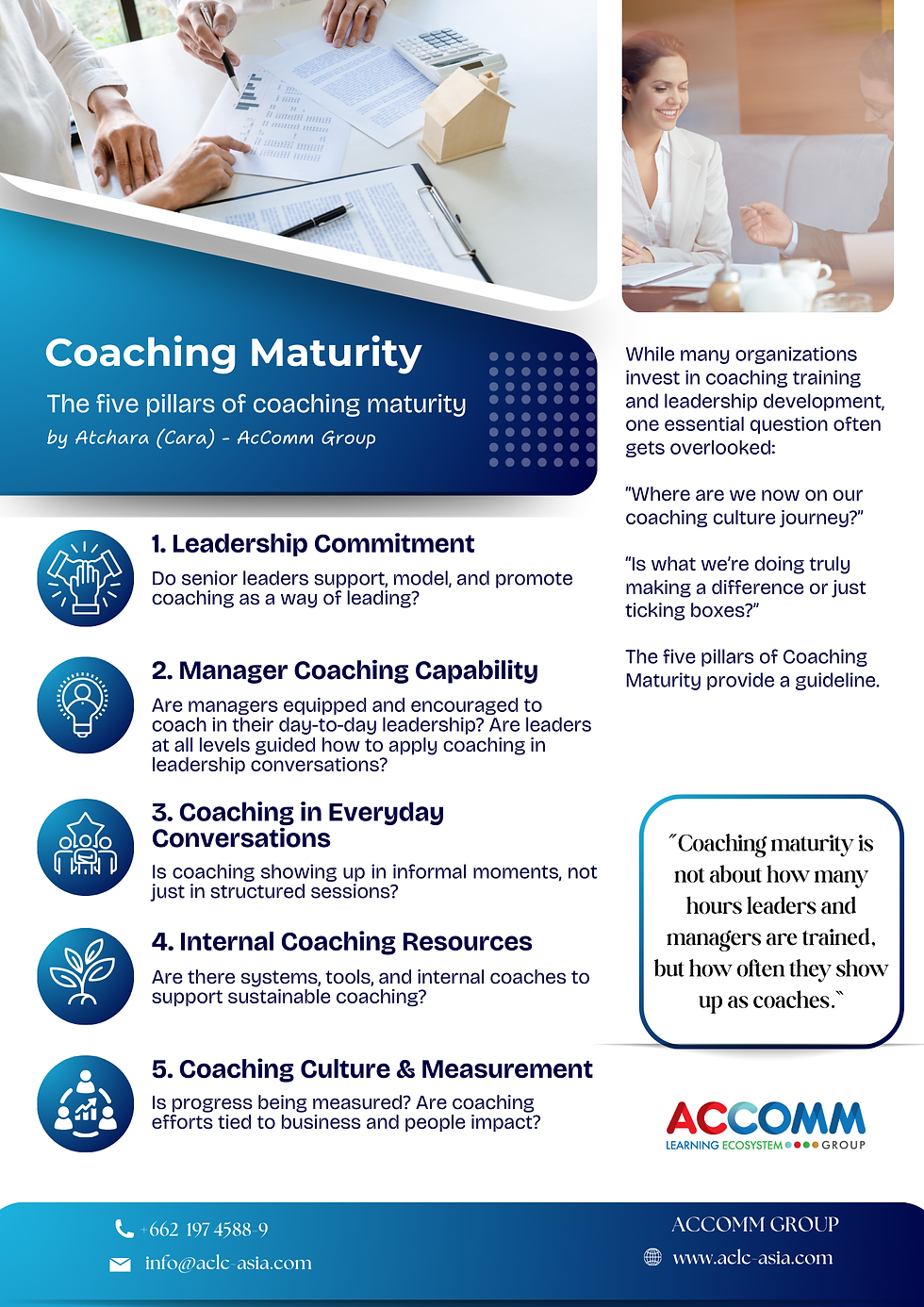ความพร้อมของวัฒนธรรมการโค้ช - Coaching Culture Maturity
- Atchara Juicharern, Ph.D.

- Sep 8, 2025
- 2 min read
Updated: Jan 26
ความพร้อมของวัฒนธรรมการโค้ช - Coaching Culture Maturity
เสาหลัก 5 ด้านของความเป็นวัฒนธรรมการโค้ชโดย ดร. อัจฉรา จุ้ยเจริญ

คำถามที่มักถูกมองข้าม
แม้องค์กรมากมายจะลงทุนในการฝึกอบรมทักษะการโค้ชและการพัฒนาภาวะผู้นำแต่คำถามหนึ่งที่สำคัญกลับมักถูกมองข้ามคือ… “ตอนนี้เราอยู่ตรงไหนบนเส้นทางของวัฒนธรรมการโค้ช?” “สิ่งที่เราทำอยู่ สร้างผลลัพธ์จริงไหม หรือแค่ทำตามรายการ?”
เสาหลักทั้ง 5 ของ Coaching Culture Maturity ช่วยเป็นแนวทางในการ:
สำรวจว่าองค์กรของท่านอยู่ระดับไหน
อะไรที่กำลังไปได้ดี และ....
จุดโฟกัสถัดไปคืออะไร
มุมมองจากเสาหลักทั้งห้า ไม่ใช่เพียงแค่การวัดผลชั่วคราว แต่คือมุมมองเชิงกลยุทธ์เพื่อการเปลี่ยนแปลงวัฒนธรรมอย่างยั่งยืน
วัฒนธรรม ไม่ได้เปลี่ยนแปลงแค่ในห้องอบรม แต่การปรับเปลี่ยนในพฤติกรรมการโค้ชมักเกิดขึ้นในโอกาสดังนี้ เช่น
การพูดคุยระหว่างวันของผู้นำกับทีมงาน
การตัดสินใจร่วมกันรายวัน
สัญญาณการปรับพฤติกรรมของผู้นำ เช่น รับฟังได้เต็มที่มากขึ้นกว่าที่ผ่านมา หรือสามารถตั้งคำถามอื่นๆ ที่นอกเหนือจากการติดตามงาน
เราจึงไม่ควรวัดแค่จุดหมาย แต่ควรวัดทั้งเส้นทางหรือระหว่างทางด้วย หากเรารอวัดผลแค่ตอนจบเราอาจพลาดโอกาสสำคัญ เช่น
ข้อมูลเชิงลึกที่มีคุณค่า
ความสำเร็จระยะต้นที่ควรเฉลิมฉลอง
วัดแค่ความพอใจ ไม่ใช่การเปลี่ยนแปลง
หรือแม้แต่จังหวะที่ควรปรับทิศทางการประยุกต์ใช้ทักษะ

เสาหลัก 5 ด้าน ความพร้อมของวัฒนธรรมการโค้ช - Coaching Culture Maturity มีอะไรบ้าง
1. ความมุ่งมั่นของผู้นำ (Leadership Commitment)
ผู้นำระดับสูงสนับสนุน แสดงแบบอย่าง และส่งเสริมการโค้ชให้เป็นรูปแบบหนึ่งของการนำทีมหรือไม่?
2. ขีดความสามารถในการโค้ชของผู้จัดการ (Manager Coaching Capability)
ผู้จัดการได้รับการฝึกฝนและสนับสนุนให้ใช้ทักษะโค้ชในการเป็นผู้นำประจำวันหรือไม่?
ผู้นำทุกระดับรู้วิธีประยุกต์ใช้การโค้ชในบทสนทนาของผู้นำหรือไม่?
3. การโค้ชในบทสนทนาในชีวิตประจำวัน (Coaching in Everyday Conversations)
การโค้ชเกิดขึ้นในช่วงเวลาที่ไม่เป็นทางการหรือไม่—ไม่ใช่แค่ในเซสชันที่เป็นทางการ?
4. ทรัพยากรสนับสนุนการพัฒนาทักษะการโค้ชอย่างต่อเนื่อง (Internal Coaching Resources)
มีระบบ เครื่องมือ หรือบุคคลภายในองค์กร ที่สนับสนุนการโค้ชอย่างต่อเนื่องหรือไม่?
5. การวัดผลและเชื่อมโยงกับวัฒนธรรม (Coaching Culture & Measurement)
มีการวัดความก้าวหน้าหรือไม่?
ความพยายามด้านการโค้ชถูกเชื่อมโยงกับผลกระทบต่อคนและธุรกิจหรือไม่?
“ระดับความก้าวหน้าของวัฒนธรรมการโค้ช ไม่ได้วัดจากจำนวนชั่วโมงฝึกอบรมของผู้นำหรือผู้จัดการ
แต่จากความถี่ที่พวกเขาแสดงบทบาทในฐานะ ‘โค้ช’ ในแต่ละวัน
แอคคอมกรุ๊ป พัฒนาทักษะการโค้ชสำหรับผู้นำในองค์กร โดยมีกระบวนการติดตามแบบกลุ่มย่อย พร้อมให้แนวทางกับท่าน ในการติดตามความคืบหน้าการประยุกต์ใช้ทักษะ

ดร. อัจฉรา จุ้ยเจริญ เป็นคนไทยคนเดียว ที่ได้รับการยกย่องให้เป็นหนึ่งในกลุ่ม "Coaches50 by Thinkers50" ซึ่งคัดเลือกโค้ชผู้บริหารระดับโลก 50 คน จัดทำขึ้นโดย Thinkers50 เป็นการรับรองผลงานของโค้ชที่สร้างผลกระทบเชิงบวกต่อภาวะผู้นำ การจัดการ และองค์กรต่างๆ ทั่วโลก รายชื่อนี้สนับสนุนโดย Coaching.com และเปิดตัวครั้งแรกในปี 2024 เพื่อระบุและยกย่องโค้ชผู้บริหารที่มีบทบาทสำคัญในการขับเคลื่อนการเปลี่ยนแปลงเชิงสร้างสรรค์ในโลกธุรกิจ
เรียนรู้เพิ่มเติม: การสร้างวัฒนธรรมการโค้ชในองค์กร
Exploring Where We Are in Our Coaching Culture Journey

Many organizations are putting time, energy, and budget into coaching training and leadership development. That’s encouraging and often a powerful catalyst for change.
But along the way, one question tends to quietly linger in the background:
“Where are we now on our coaching culture journey?”
“Is what we’re doing truly making a difference or are we just ticking the right boxes?”
It’s a fair question. And maybe it’s not about having a perfect answer, but about being curious enough to look.
This is where something like the Coaching Culture Maturity can be helpful, not as a rigid tool, but as a conversation starter.
With these five pillars, Leadership, Managers, Everyday Coaching, Resources, and Measurement, it offers a lens to notice:
What’s already working?
Where is momentum building?
And where might we shift attention to help the culture grow?
It’s not about collecting another score. It’s about gaining perspective, seeing the whole picture rather than just a snapshot.
Culture Doesn’t Shift All at Once
Sometimes we assume change happens in the classroom. But more often, it unfolds in the space between.
In small habits.
In everyday conversations.
In quiet decisions and subtle signals from leaders.
And if we only measure once, say, at the end of a program, we might miss so much:
The moments that matter
The progress worth celebrating
The chance to adjust when it still counts
Maybe It’s Worth Asking…
What if we measured the journey, not just the destination?
What might we discover?
What might we reinforce?
Because culture isn’t built in one big step. It’s shaped one coaching moment at a time.

Atchara Juicharern is one of the "Coaches50 recognized by Thinkers50", the only Thai who is recognized in the list of the world's 50 best executive coaches compiled by Thinkers50. This is a recognition of the work of coaches who are making a positive impact on leadership, management and organizations around the world. Powered by Coaching.com and launched in 2024, the list aims to identify and honor executive coaches who are playing a key role in driving constructive change in the business world.
Explore more about: Coaching Culture in Organizations
*****************************************************************





Comments